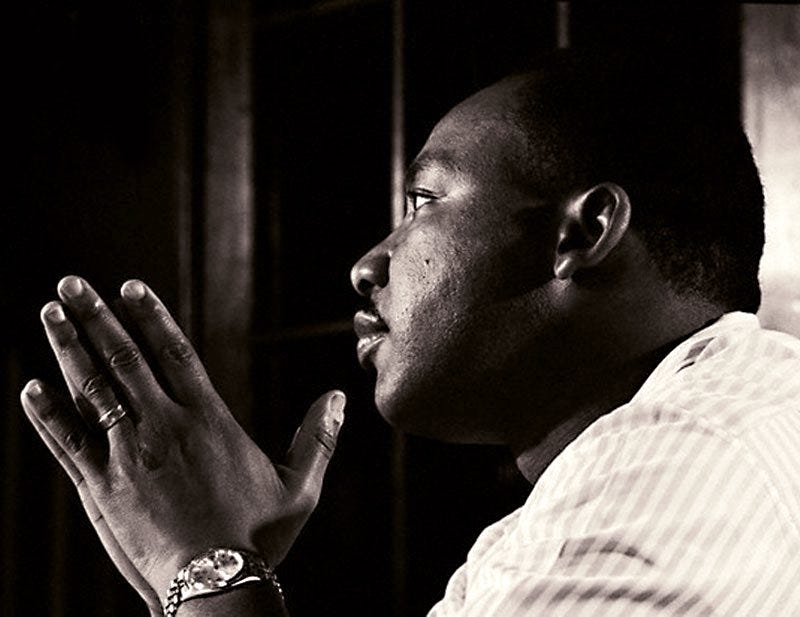Windows, Before Mirrors
What If Extrospection, Not Introspection, Is the Political Superpower of the Future?
“We have to look in the mirror,” said U.S. Senator Chuck Schumer in the aftermath of the November 2024 presidential election. He, of course, was not alone in calling for a period of introspection in the Democratic Party.
“Introspection,” and its word cousins - from “self-reflect” to “soul search” - have been coursing through left-leaning discourse these last months.
But what exactly does it mean to “introspect”?
“A reflective looking inward: an examination of one’s own thoughts and feelings,” according to Mirriam Webster.
But is what’s most pressing at the moment the need for Democrats to reflect… on their own inner monologue?
To some extent, yes: for nearly a decade, liberals have embraced a sometimes-strident posture centered on the primacy of identity, righteousness of their cause and uncritical fanfare for its leaders - a posture many voters found uninspiring, and even unbecoming, in part given American liberalism’s inspired heritage as a center of inclusion, invitation and intellectual dynamism. I was once a part of this uninviting posture.
But the aftermath of the 2024 election may demand more than introspection; indeed, on the eve of both President-elect Trump’s inauguration and a leadership election within the Democratic Party, it may be time for a commitment to extrospection: a time to consider and observe, with depth of feeling, what is wholly external to, and even far-flung from, the self.
But, you might say, what utility, really, is there to be found in this semantic switch from “introspection” to “extrospection”?
“When we say introspect, we actually mean extrospect!,” I can hear from many-a progressive.
Language is all we have, though. Words create the culture - and the realities - we live into. Precision… it still matters.
Reflect on our uniquely-American language, for a moment: words and phrases like “start-up,” “influencer,” “innovate,” “hustle,” “entrepreneurship,” “American Dream,” “Red State, Blue State” and “What do you do?” have created just some of the realities so many of us behave and believe into.
And as it happens, according to many voters, it was issues having to do with language - or, more precisely, the ability to exteriorize one’s interior language in the form of free speech - that were at least partially determinant in this election.
Language really, is, all around.
And now, enter into the discourse as a main character of sorts: “Introspect.”
To commit oneself, and a political party, to an introspective project is akin to Monday-morning quarterbacking one’s own play calling in last night’s game.
Listening to any number of early reflections from those most active in the Democratic Party’s story of 2024 - from Harris campaign officials on Pod Save America to former President Obama’s remarks at a Foundation event in December - it’s hard not to be struck by the self-seeking nature of the discourse to date.
‘We just didn’t have enough time.’
‘We don’t have an equivalent digital media ecosystem.’
‘We were victims of anti-incumbent conditions sweeping the globe.’
In fact, transcripts of too many discussions in left-leaning media these last months read like a parade of “I’s” and “We’s” … with scant language devoted to respectful, reverential - and even emotive - reflections about the tens of millions of fellow Americans who quietly disagreed. Is there no wisdom to be gained from them?
Sure, it’s early days, but bad habits settle quickly, and cascade down from the top.
What if more electoral postmortems had included remarks along the lines of:
‘If only we’d better understood how tens of millions of our fellow Americans felt.’
‘The other side wasn’t just savvy… they saw wisdom, not merely wants, in the grassroots.’
‘Before creating our own podcast ecosystem, maybe we should become listeners of theirs?’
To extrospect would be to travel to your opponent’s sideline and listen … to not merely point from midfield, but to go all the way and listen - without judgment or snark - again and again, to the pods they believe are saving America.
To extrospect would be to sit with dyed-in-the-wool conservatism - including the debates and divisions therein across a movement as old as the nation - and stay seated. And even find an idea or two that inspires.
To extrospect would be to revere parts of the American past previously and wholly disregarded as shameful and find a pearl of wisdom in people previously torn down.
To extrospect would be to see beauty - and not off-putting bravado - in tens of millions of middle-class Americans who say they believe they voted for security, sustenance - and to feel seen.
To extrospect would be to see profound civic faith, not irresponsible judgment, in those who believe, like William Buckley Jr did, that ordinary Americans - randomly selected from a phone book - might be just as capable at leading our government as those from credentialed corners and coasts.
To extrospect would be for me to hear a fellow American tell me, the son of immigrants, “Rishi, the loss of jobs in our community the last sixty years correlates almost perfectly with immigration policies that led to your family’s arrival in this country” and say simply, “There’s deep truth in your reflection, and I understand.”
In short, to extrospect would be to listen from windows… before reflecting in mirrors.
When we courageously extrospect - that is, when we sit with, take great pains to see, lift up and even feel inspiration from human others, and their best ideas - we ultimately enrich ourselves. Slowly, we improve our own posture, our own positions and our own purpose - and win.
Before the election, I published a public essay chronicling my drifts this last decade from today’s Democratic Party, notwithstanding having been an early fundraiser for Kamala Harris, an Obama-movement social entrepreneur and leader of many-a-liberal-leaning institution.
Truth be told, I thought of my process and the piece, entitled “The Wonder Years” - in which I wondered if there was still room to fearlesssly wonder inside today’s Democratic Party - as an introspection of sorts.
But, in retrospect (yes, another ’spect), what undergirded my own journey of introspection - indeed, what came before it, a prequel of sorts - was a long phase of extrospection after 2016’s surprising electoral result. An extrospection that consisted of reading books by unfamiliar conservative writers while others asked why. Of quietly listening to right-leaning podcasts while running by. Of traveling through YouTube’s memory lane and finding old episodes of Firing Line. All while reserving judgment, and the temptation to center myself in the story.
Over time, it dawned on me: has the fact of conservatives coming of age in an America dominated by left-leaning hegemonic institutions - in academia, the media and mass culture - been a blessing, and not a curse? A blessing in that it’s gifted them with an ability - and even a superpower - to sit constantly with the ideas of political others?
Indeed, up until November 5, 2024, was to be a conservative in America a fundamentally extrospective exercise?
Does swimming hard against the currents of mass culture activate the muscles of extrospection? Whereas does swimming with ease with these same cultural currents cause these same muscles to atrophy?
While there are bright extrospective spots to be found on the left and right - including Cornel West and Robert George whose new book Truth Matters dwells on these themes - much work lies ahead to advance an American political culture that prioritizes curiosity before conviction.
But as we approach our 250th anniversary as a nation and as I, like many, reflect on what’s empirically proven astonishing about the American experiment, isn’t it… our spirit of extrospection?
The basis of entrepreneurship, of self-government under God and of our aspired-for perfect union is the superpower of extrospection: of channeling our shared inner expat - after all, we’re all descended from expats of sorts - and watching human nature with an eye on wisdom and not wisecracks… and meeting it where it is: with public institutions that check our worst impulses, with products that speak to our needs and with a patriotic purpose that helps us answer, “Why?”
Martin Luther King Jr., whose 96th birthday we observe tomorrow, once said:
“Rarely do we find men [people] who willingly engage in hard, solid thinking. There is almost a universal quest for easy answers. Nothing pains some people more than having to think.”
Might committing this year to extrospection - a quest to live outside ourselves - form the starting point of the hard, solid thinking Dr. King dreamed of?




YES YES YES